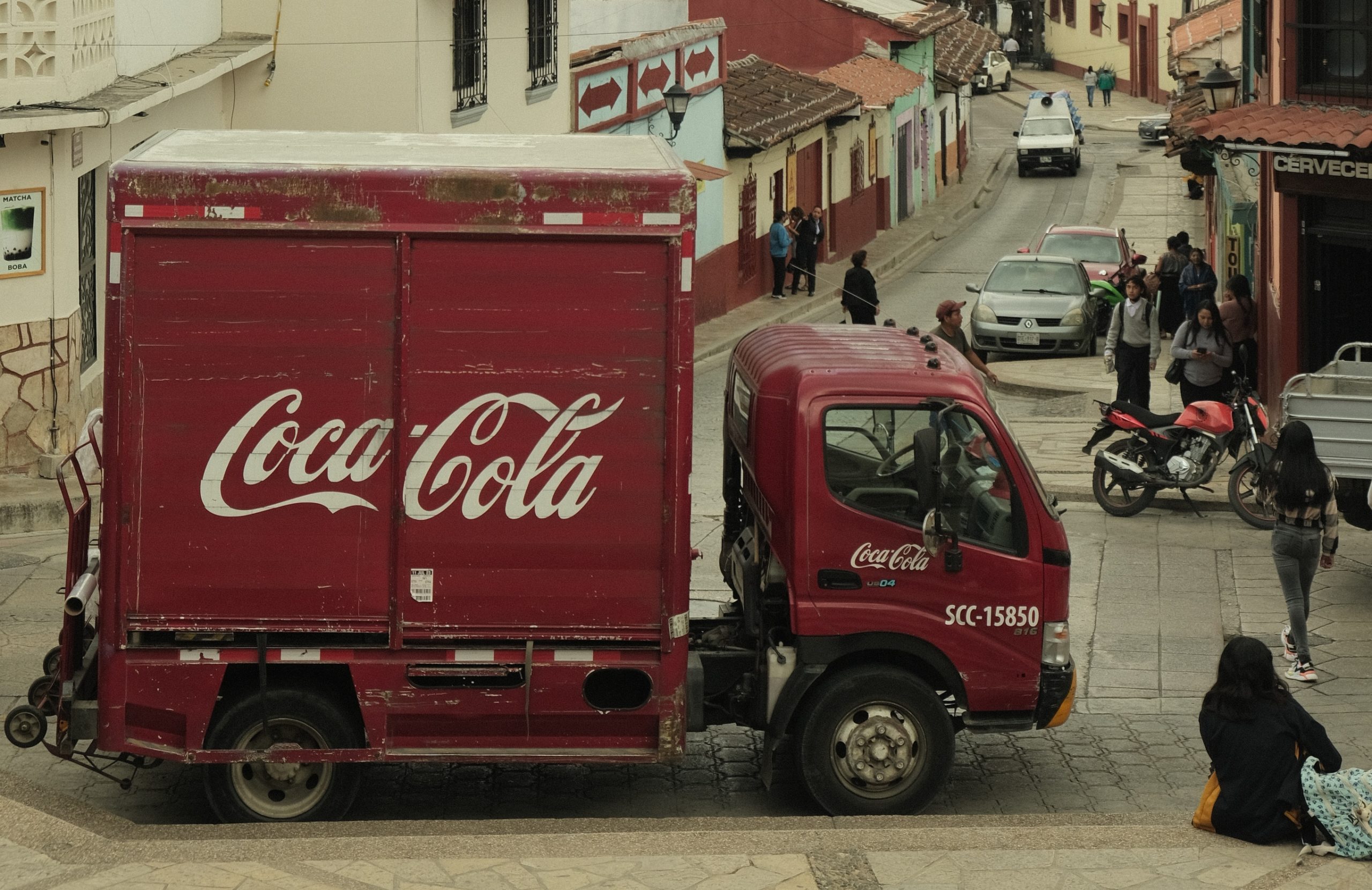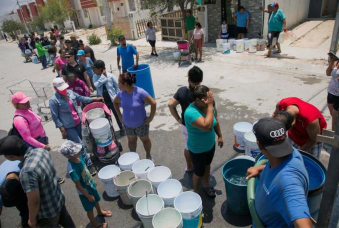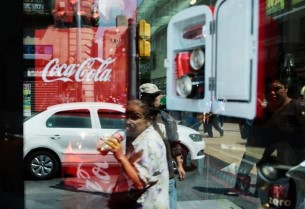Students on the course ‘Food Crises: the Big Picture’ were given the assignment to write a blog on food security. ‘Holy Coca-Cola: quenching thirst or fuelling obesity?’, written by Daphne Leenders, is about the role of Coca-Cola in the Mexican water crisis and the ‘obesity epidemic’.
Just an hour colectivo ride from San Cristobal de las Casas, in Mexico’s poorest state Chiapas, lies the magical Maya village of San Juan Chamula. For tourists, Sundays are best for visiting the town’s so-called Coca-Cola iglesia where they can witness a truly bizarre religious service. Amidst the remarkable aspects of these spiritual rituals, one element undeniably steals the show: Coca-Cola, which the indigenous Tzotzil population believes has the power to heal the sick.
It is evident that Coca-Cola’s influence extends far beyond mere refreshment. What else than aggressive marketing has the power of integrating non-essential commercial products into local cultures? As we delve into the world of Coca-Cola, we find a company that has indeed employed one of the most remarkable marketing strategies, and with big success. It is now among the world’s most recognizable brands with people all over the globe consuming their beverages. With a 70 per cent dominance in the Mexican beverage industry, they are the undisputed market leader which is in accordance with their goal and company slogan, “an arm’s length from desire”. The so-called Coca-colonization has thereby positioned Mexico as one of the world’s top consumers of sugary drinks.
Neoliberalism
But the success story stops here. With the pressing effects of climate change and deteriorating public health, questions arise about the disruptive influence of neoliberalism, which grants private corporations such as Coca-Cola extensive market access and a role in the political sphere.
Mexico is now facing its worst water crisis in three decades with nearly half of its people not having access to safe drinking water due to climate change, poor infrastructure and the exploitation of the Mexican lands by large companies. Water insecurity, as we will explore, translates into food insecurity, as it increases lifestyle-related health problems among the Mexican population. And in this unfolding narrative, one controversial figure steps into the spotlight: Coca-Cola. While Mexico is buffeted by the dual crisis of chronic water shortage and obesity, Coca-Cola continues to bottle and sell its products in the country, making it one crucial party in this multifaceted crisis. This leaves us with one final fundamental question: At the moment we start ‘believing’ in Coca-Cola, is there still a way to reverse this trend?
Water stewardship
The wide-scale water insecurity causes taps to run dry across the country. Drought, heat, and other extreme weather events fueled by climate change are partly to blame, but so is the inefficient infrastructure and years of mismanagement of water. In addition, population growth, development and changing consumption patterns have caused Mexico’s water supplies to be depleted at an even higher pace.
More than ever, Mexico now needs all its water. While the country is experiencing one of its most severe droughts, it has not stopped companies including Coca-Cola and Heineken from extracting billions of liters of groundwater from public reservoirs and private wells in the area. Coca-Cola’s promise to ‘give back every drop of water that goes into a bottle’ is unquestionably insufficient, given that it requires a staggering 70 times more water to produce just 1 liter of Coca-Cola. ‘Water stewardship’ is the term used by the Coca-Cola.
Company to refer to its approach to water management. They prominently state that ‘water is a priority because it is essential for life, our beverages and the communities we serve’; which is a very iconic order, placing their beverages before communities.
Public welfare
Not surprisingly, the soda company is increasingly being criticized and boycotted for straining water resources and thereby worsening Mexico’s water crisis. ‘Coca-Cola is abusive, manipulative. They take our pure water; they dye it, and they trick you on TV saying that it’s the spark of life. Then they take the money and go’, said one citizen of San Cristobal de las Casas. Here, neighborhoods currently have running water just a few times a week and many households are forced to buy extra water from tanker trucks. Yet, on the edge of this town lies one of Coca-Cola’s bottling plants, making their sugary beverages highly available at prices nearly as low as bottled water.
This bizarre dynamic underscores the far-reaching impact of laissez-faire economic policies and neo-capitalism. The prioritization of market freedom over essential public services like clean water has created a disturbing imbalance, making products like Coca-Cola more accessible than the most fundamental human necessity. Persistent underinvestment in water infrastructure and the influx of processed foods are not just coincidental; they are consequences of policies that prioritize profit over public welfare. This paradox serves as a stark reminder of the profound societal implications of neoliberal ideologies.
Mexico’s refresco addiction
It is absurd to believe that some Mexican states find Coca-Cola products cheaper than water, incentivizing the consumption of soft drinks. Besides that, people increasingly turn towards processed foods, driven by shifting dietary habits and evolving norms associated with urban and modern living. Traditional diets are under pressure to give way to a commercialized food system, resulting in a universally accepted trend of ‘calorie-dense but nutrient-poor foods’ becoming a common element of diets. Here, it is crucial to turn our focus towards another alarming aspect of the company’s influence on Mexico’s food security.
With a staggering increase in obesity rates of 42 per cent between 2000 and 2018, Mexico is now suffering a major public health crisis, referred to as the obesity epidemic. Sugarsweetened beverages, including CocaCola, are contributing to the rising incidence of diet-related diseases, such as obesity, hypertension, and diabetes leading to major complications. The seriousness of this issue can be attributed to what we define as the ‘obesogenic environment’ which spans across multiple domains, including the physical, socio-cultural, economic and political aspects of our lives. Within this complex landscape, the consumption of sugar-sweetened beverages, such as Coca-Cola, goes beyond financial attractiveness; it has become deeply ingrained in Mexican culture, complicating the nation’s efforts to combat the obesity epidemic. Consequently, within the states where Coca-Cola products are cheaper than water, obesity is a symptom of poverty rather than the result of individual choices and lifestyle.
Coca-Cola policy
But Coca-Cola’s influence extends not only into cultural and economic domains, as the soda company has now also entered the political sphere. There is growing evidence that Coca-Cola strategically frames the debate on diet- and nutrition-related issues in its favor. Efforts have been made to shift blame from the rising incidence of obesity and diet-related diseases away from its products onto physical activity and individual choice. Such strategies continuously obstruct the prioritization of public health policies. As a result, the sugar sweetened beverage industry gains a privileged position in markets, enabling them to streamline the marketing, sale, and consumption of their products. Here again, the principles of laissez-faire and neoliberalism are interwoven in the current socio-political landscape, where corporate interests often take precedence over broader societal concerns.
Tax
Mexican policy makers have tried to respond through a variety of policies to reverse the trends of obesity and diabetes. In 2014, they implemented a public health policy, imposing a tax of one Mexican peso per liter on sugar-sweetened beverages. However, a recent study evaluating the effectiveness of this tax found no significant reduction in the purchase of taxed beverages in urban Mexico. Five years later, another policy intervention was introduced to nudge consumers towards healthier choices. This initiative required products exceeding specific nutritional thresholds for calories, sugar, trans-fat, and sodium to display a prominent front-of-package label. However, it remains apparent that these policies focus almost exclusively on using consumer incentive approaches to shift individual dietary decisions, overlooking the overarching structural issues maintained by market-driven ideologies and highlighting the necessity for a more comprehensive approach to addressing the broader societal impacts of these strategies.
In conclusion, Coca-Cola’s 70 per cent dominance in Mexico’s soda industry not only exerts considerable political, economic, and even religious influence but also comes at the cost of public health and environmental sustainability. This case strongly demonstrates the challenges posed by powerful food and beverage corporations to public health efforts aimed at combating diet-related diseases and enhancing dietary habits. Therefore, governments and civil society should restructure their relationship with the soda industry and demonstrate the political will to reverse the tide in food insecurity issues.
But this story isn’t only about sugary drinks and corporate influence. It is also about overcoming obesity stigmatization and recognizing the broader biosocial aspects. In the Mexican context, particularly, we must consider structural and sociopolitical factors that shape the food landscape. To address the complex global issues of climate change and obesity, a shared social responsibility is expected from all of us, and Coca-Cola has regrettably failed to recognize and uphold theirs.

 A Coca Cola-truck in San Cristobal de las Casas. Photo Austin Curtis Unsplash
A Coca Cola-truck in San Cristobal de las Casas. Photo Austin Curtis Unsplash 




